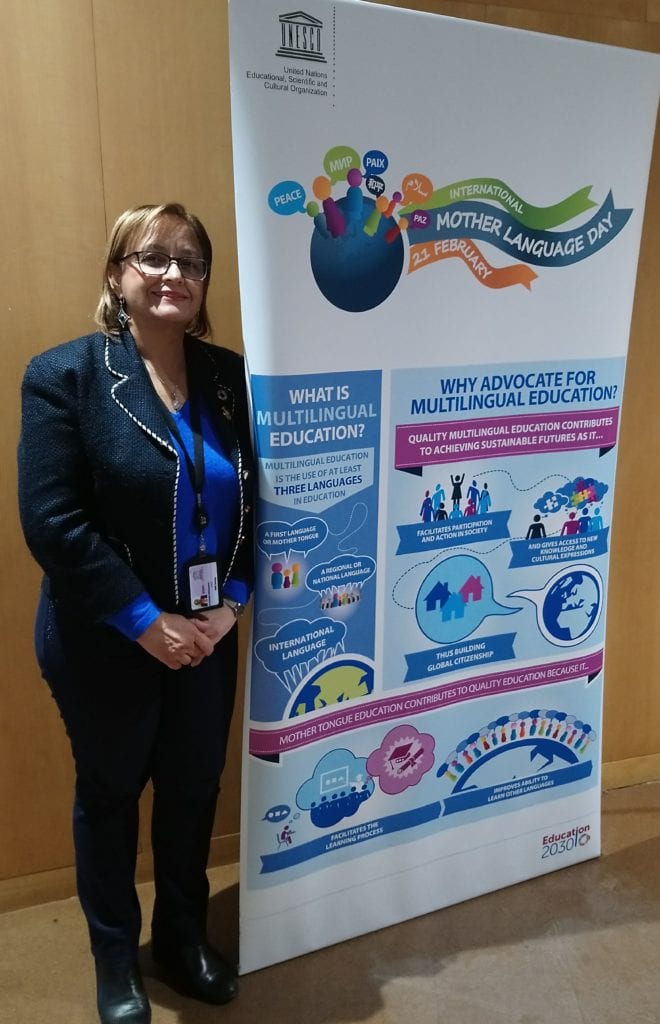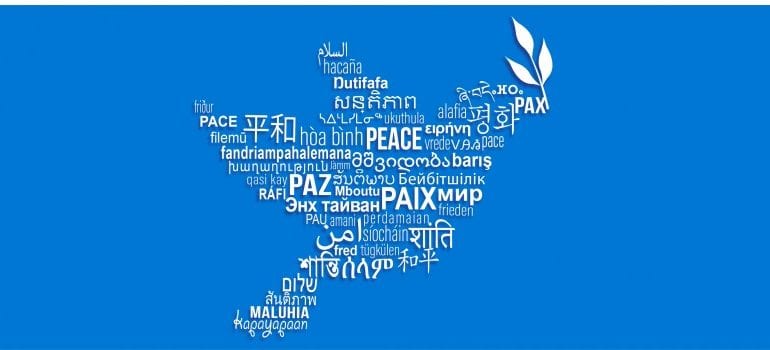Blog by Evelyne Para, SI UN Representative at UNESCO Paris.
“On 21 February, all over the world, International Mother Language Day was celebrated. The 2020 theme was ‘Languages without borders’. On this occasion, UNESCO organised in Paris a space for reflection and dialogue on the contexts, challenges, and strategies to promote the right to multilingual education based on the mother tongue(s), a regional or national language and an international language. This meeting was also about promoting cross-border languages as a vector for dialogue “inspiring solidarity based on understanding”, which defends tolerance and respect for others. As SI UN Representative, I had the chance to participate in this important meeting alongside the representatives of the Permanent Delegations of many countries, members of Civil Society Organisations, expert linguists of academic institutions, and students.
If you don’t understand, how can you learn?
In the first part of this conference day, the speakers showed that quality education should be delivered in the language spoken at home. However, this minimum standard is not met for hundreds of millions of children, hindering the early acquisition of critically important skills in literacy and numeracy, and limiting their ability to develop foundations for learning. Their parents may lack literacy skills or familiarity with official languages used in school, which can then reinforce gaps in learning opportunities between minority and majority language groups. By one estimate, as much as 40% of the global population does not have access to an education in a language they speak or understand. Mother tongue based bilingual (or multilingual) education approaches, in which a child’s mother tongue is taught alongside the introduction of a second language, can improve performance in the second language as well as in other subjects. Poverty and gender magnify educational disadvantages linked to ethnicity and language. With a new global education agenda that prioritises equity and lifelong learning for all, ‘so that no one is left behind’, the policy of respecting language rights is essential and deserves close attention.

SI UN Representative, Evelyne Para.
We need good teachers and inclusive learning materials
Good teachers are critical for helping the most disadvantaged learners. They must be supported with appropriate assessment strategies. Children who speak minority languages not taught in the classroom often enter school with a lack of self-confidence, a low self-esteem and learning needs that teachers may feel unable to meet. Schools can play an important role in changing this situation. Hiring teachers from minority language communities can help widen children’s horizons and raise their ambitions. Yet, because ethnic and language minorities often obtain less formal education than majority groups, there are not enough teachers who speak local languages, and very few bilingual teachers belong to minorities, which compounds the disadvantage children face when their home language is not the medium of instruction.
Testimonies from different countries
For example, Ecuador and Bolivia have specialised institutes for the training of teachers on indigenous languages which were created in order to promote the policy of bilingual training in these countries. Similarly, in Australia, a program launched in several public schools is attempting to change how teachers view Aboriginal languages. This program highlights the importance of all Australian students receiving an education that is sensitive to the history, culture and language of indigenous Australians and that also takes into account the backgrounds of people from other minority groups. Another interesting example: in South Africa, the Breadbin Interactive Project provides a cost-effective way of disseminating learning materials in digital form, including in local languages. Out of the classroom, the Nal’ibali initiative supports volunteer-run reading clubs by producing colourful bilingual supplements, with stories, ideas for literacy activities, and reading tips, available in English and Xhosa or Zulu.
Language in education policies can be a source of grievances
Language both reflects the culture of one’s community as well as an individual’s ethnic identity. The language(s) one learns and speaks often create a sense of personal identity and group attachment. Yet, language can serve as a double-edged sword: while it strengthens an ethnic group’s sense of belonging and social ties, it can also turn into a basis for their marginalisation. The language of instruction is sometimes a divisive political issue, and if we are not careful, language policy in education has emerged as a focal point for violent conflict. In multi-ethnic countries, for example, the imposition of a single dominant language as the language of instruction in schools, while sometimes it’s a choice of necessity, it has been a frequent source of grievance linked to wider issues of social and cultural inequality.
For example, disputes about using Kurdish in schools have been an integral part of the conflict in eastern Turkey. Another example: Guatemala’s imposition of Spanish on schools was seen by indigenous people as part of a broader pattern of social discrimination. Disputes over language often reflect long stories of domination, subordination and, in some cases, decolonization. In Algeria, the replacement of French by Arabic in primary and secondary schools after independence in 1962 was intended to build the new government’s legitimacy but marginalised the non-Arabic speaking Berber minority (still today). Again, the failure to recognise Bengali, spoken by the vast majority of the population of East Pakistan, was one of the major sources of the conflict which led to the secession of East Pakistan and the creation of a new country, Bangladesh. The idea to celebrate International Mother Language Day was the initiative of Bangladesh. It was approved at the 1999 UNESCO General Conference and has been observed throughout the world since 2000.
In summary, the development of multilingual education based on mother tongue instruction, not only improves learning outcomes, but also helps to maintain linguistic diversity and multilingualism: it’s a key element of inclusion. In the right circumstances, it can also be a powerful tool for the promotion of peace between neighbouring countries.
Helpful Resources (click to view):
UNESCO’s Language Without Borders video.
Feature image: courtesy of UNESCO

